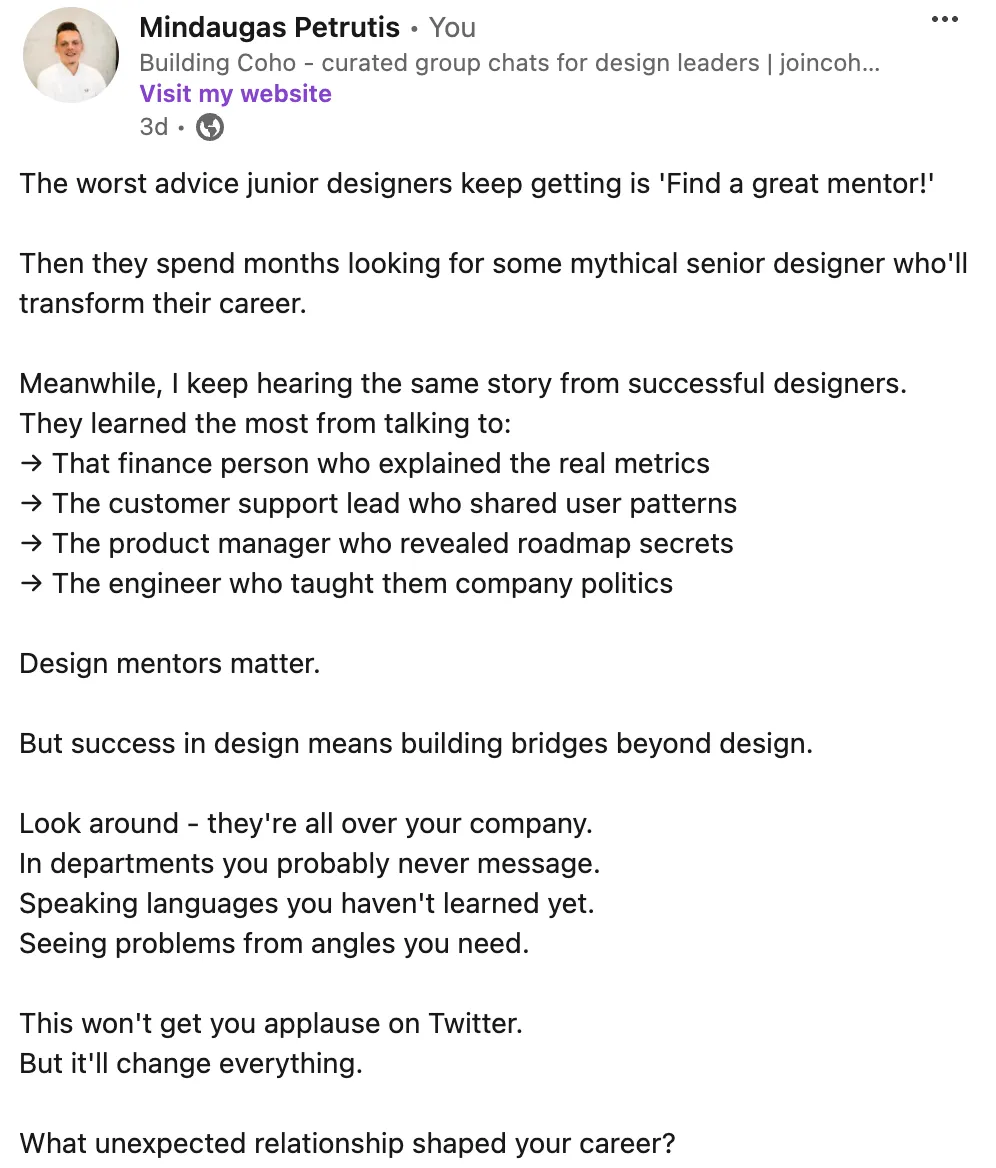
Mindaugas Petrutis
9 Dec 2024

The tech industry loves its myths.
And one of the most pervasive is the idea that every junior designer needs a seasoned mentor to guide them to success. It’s the sort of advice that sounds good on LinkedIn, pithy, actionable, shareable.
But like so many things in the design industry, it crumbles under closer scrutiny. The truth is, chasing after a mythical mentor is leading too many new designers astray.
The problem with the “find a mentor” advice is that it’s both too narrow and too passive. Too narrow because it implies that the only valuable advice and learnings come from within the design community.
And too passive because it suggests that a junior’s role is simply to receive wisdom, rather than actively seek it out.
In a recent LinkedIn post, I shared my thoughts on this topic:

A bunch of designers jumped in with their takes and stories.
As one commenter put it, “Building bridges with other departments was one of the best pieces of advice I got in my career. It not only helped me improve my communication skills and better connect with others, but also gave me the confidence to negotiate with peers and stakeholders on what truly mattered to our customers.”
These designers learned a powerful lesson early on: that success in design means looking beyond design. It means recognising that our pretty mockups and prototypes are just one small part of a much larger equation. And that to truly create value, we need to understand that equation from every angle.
This is why I believe that one of the most important skills for junior designers is learning to build bridges. It’s having the curiosity and humility to seek out new perspectives, even when, especially when, those perspectives challenge our assumptions.
Now, let me be clear: I’m not saying that design mentorship has no value.
Of course it does.
As one seasoned designer noted in response to my post, “Design mentors are critical. Working designers (actually all professionals) suffer from the ‘curse of knowledge.’ We assume everyone knows what we know. In particular, we need to help early-in-career and leveling-up professionals identify their skill and knowledge gaps.”
But I also see that by placing so much emphasis on finding the “perfect mentor,” we’re encouraging a kind of tunnel vision that can limit growth.
I believe that every person in your organisation, from the intern to the CEO, has something to teach you. Every interaction is an opportunity to learn and grow. But you have to approach those interactions with an open mind and have a willingness to step outside your comfort zone.
So here’s my advice to junior designers: by all means, seek out mentorship and guidance from experienced designers. But don’t stop there. Make a point of building relationships with people outside your immediate orbit.
Sit in on a sales call.
Shadow a customer support rep.
Ask an engineer to walk you through their code.
As another commenter shared, “The person that helped me out the most was a product manager. She automatically helped me fix problems I was having when it came to interviewing, and even helped me lay out a roadmap of how I was going to get from point A to point B in achieving my career success.”
These interactions will feel uncomfortable at first.
You’ll likely worry about asking naive questions or not having anything valuable to contribute. But push through that discomfort. Because the insights you gain will be invaluable. You’ll start to see your work, and your role, in a whole new light.
Building real relationships does take time. There’s no way around it. If you want to learn from people who have something to teach you, you have to be willing to put in the effort. Not just once, but consistently, over the long haul.
This isn’t advice you’ll hear often because we live in a world that’s all about hacks and quick fixes. Everyone wants the shortcut, the magic bullet that will solve all their problems overnight.
But there are no shortcuts.
The things that matter most in your career, and in your life, they require patience, persistence, and a willingness to play the long game.
So if you’re serious about growing as a designer, if you really want to build a strong foundation for your career, start investing in those relationships now. There will be times when you feel like you’re putting in a lot of effort without much to show for it. But stick with it. Keep showing up, keep asking questions, keep learning from everyone you meet.
My point is that you don’t need a mentor to tell you this.
You don’t need anyone’s permission to start building these relationships, to start learning from the smart, passionate people around you. All you need is a bit of curiosity, a bit of humility, and not being afraid to send that message. Because the worst thing that can happen is that they don’t respond. That’s it.
So, why not start today. Reach out to someone in a different department, someone whose work you admire or whose perspective you want to understand. Ask them to coffee, to lunch, to a quick Zoom chat. Come prepared with questions, but more importantly, come prepared to listen. To really listen, not just to wait for your turn to speak.
Will every conversation be a revelation? No.
Will every relationship be career changing? Probably not. But every interaction will teach you something. And over time, those lessons will add up. They will compound. They’ll shape the way you think, the way you work, the way you solve problems. And that’s something that will serve you well no matter where your career takes you.
Then, one day, when some bright-eyed junior designer comes to you looking for guidance, you’ll have your own story to share. Not about some mythical mentor who had all the answers, but about the network of colleagues, collaborators, and friends who helped you find your way.
I believe that’s the real secret to success. It’s not one mentor who’ll shape you but the collective wisdom of everyone you’ve learned from and the sooner you start, the better.
If this resonates, continue the conversation in a Coho peer group. Every two weeks, meet with 5 peers (senior to director) who help you tackle what's next. Get nuanced advice from designers at Spotify, Meta and Hubspot.